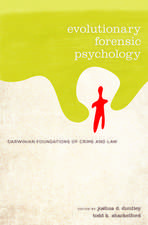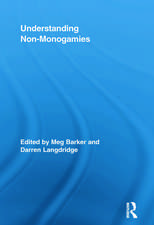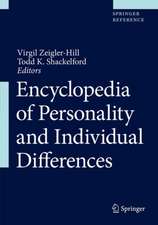Evolutionary Perspectives on Human Sexual Psychology and Behavior: Evolutionary Psychology
Editat de Viviana A. Weekes-Shackelford, Todd K. Shackelforden Limba Engleză Hardback – 8 mar 2014
| Toate formatele și edițiile | Preț | Express |
|---|---|---|
| Paperback (1) | 807.59 lei 17-23 zile | +69.28 lei 7-11 zile |
| Springer – 3 sep 2016 | 807.59 lei 17-23 zile | +69.28 lei 7-11 zile |
| Hardback (1) | 963.60 lei 6-8 săpt. | |
| Springer – 8 mar 2014 | 963.60 lei 6-8 săpt. |
Preț: 963.60 lei
Preț vechi: 1175.12 lei
-18% Nou
Puncte Express: 1445
Preț estimativ în valută:
184.38€ • 192.53$ • 152.26£
184.38€ • 192.53$ • 152.26£
Carte tipărită la comandă
Livrare economică 15-29 aprilie
Preluare comenzi: 021 569.72.76
Specificații
ISBN-13: 9781493903139
ISBN-10: 1493903136
Pagini: 432
Ilustrații: XIII, 418 p. 32 illus.
Dimensiuni: 178 x 254 x 30 mm
Greutate: 0.97 kg
Ediția:2014
Editura: Springer
Colecția Springer
Seria Evolutionary Psychology
Locul publicării:New York, NY, United States
ISBN-10: 1493903136
Pagini: 432
Ilustrații: XIII, 418 p. 32 illus.
Dimensiuni: 178 x 254 x 30 mm
Greutate: 0.97 kg
Ediția:2014
Editura: Springer
Colecția Springer
Seria Evolutionary Psychology
Locul publicării:New York, NY, United States
Public țintă
ResearchCuprins
Section 1: Introduction to Evolutionary Perspectives on Human Sexual Psychology and Behavior.- Evaluating Evidence of Mate Preference Adaptations: How Do We Really Know What Homo sapiens sapiens Really Want?.- Section 2: Sexual Adaptations in Men.- Adaptation and sexual offending.- Sexual selection on human voices.- Agreement and individual differences in men’s preferences for women’s facial characteristics.- Male adaptations to female ovulation.- (Mis)reading the signs: Men’s perception of women’s sexual interest.- Bodily Attractiveness as a Window to Women’s Fertility and Reproductive Value.- Social and environmental conditions intensifying male competition for resources, status, and mates lead to increased male mortality.- Male production of humor produced by sexually selected psychological adaptations.- Male adaptations to retain a mate.- Section 3: Sexual Adaptations in Women.- Evolutionary psychology and rape avoidance .- Female orgasm.- Female adaptations to ovulation.- Women’s preferences for male facial features.- Women’s disgust adaptations.- Female Perceptions of Male Body Movements.- Intrasexual Competition and other Theories of Eating Restriction.- Attractiveness and rivalry in women’s same-sex friendships.- Section 4: Conclusions and Future Directions for Evolutionary Perspectives on Human Sexual Psychology and Behavior.- Evolutionary perspectives on homosexual psychology and behavior.- Reflections on the Evolution of Human Sex Differences: Social Selection and the Evolution of Competition among Women.
Recenzii
"Evolutionary Perspectives on Human Sexual Psychology and Behavior is one of the first volumes in this series. It contains 20 informative and thought-provoking chapters on human sexual cognition and behavior. Most of the chapters (17 of 20) are organized into two sections: Male Sexual Adaptations and Female Sexual Adaptations.
The chapters are appreciably diverse, covering topics such as mate preferences (e.g., for facial characteristics and body types), physical manifestations of evolutionarily relevant information (e.g., body shape as an indicator of female fertility), sexual behavior (e.g., forced copulation), mating cognition (e.g., perception of sexual interest), and intrasexual competition (e.g., restricted eating among women). Sensibly, some important themes recur across various chapters, such as ovulatory cycle effects (which appear in chapters on men’s sensitivity to female ovulation, male mate retention, female rape avoidance, female preferences for male characteristics, female disgust sensitivity, to name a few)...In conclusion, the editors of this book did an excellent job soliciting chapters on a variety of topics within human sexual psychology and behavior from an evolutionary perspective. The chapters are generally well written, and most of them present richly detailed literature reviews or helpful introductions to competing theories on a single topic. This book will appeal to researchers and connoisseurs of evolutionary psychology who will benefit from the mix of chapters containing tidy summaries and helpful comparisons of competing theories."
Christina M. Brown, PsycCRITIQUES
August 11, 2014, Vol. 59, No. 32, Article 7
The chapters are appreciably diverse, covering topics such as mate preferences (e.g., for facial characteristics and body types), physical manifestations of evolutionarily relevant information (e.g., body shape as an indicator of female fertility), sexual behavior (e.g., forced copulation), mating cognition (e.g., perception of sexual interest), and intrasexual competition (e.g., restricted eating among women). Sensibly, some important themes recur across various chapters, such as ovulatory cycle effects (which appear in chapters on men’s sensitivity to female ovulation, male mate retention, female rape avoidance, female preferences for male characteristics, female disgust sensitivity, to name a few)...In conclusion, the editors of this book did an excellent job soliciting chapters on a variety of topics within human sexual psychology and behavior from an evolutionary perspective. The chapters are generally well written, and most of them present richly detailed literature reviews or helpful introductions to competing theories on a single topic. This book will appeal to researchers and connoisseurs of evolutionary psychology who will benefit from the mix of chapters containing tidy summaries and helpful comparisons of competing theories."
Christina M. Brown, PsycCRITIQUES
August 11, 2014, Vol. 59, No. 32, Article 7
Notă biografică
Viviana A. Weekes-Shackelford is currently a special lecturer at Oakland University, Department of Psychology. She received her Ph.D. at Florida Atlantic University in 2011 with areas of specialization in evolutionary psychology and developmental psychology.
Todd K. Shackelford received his Ph.D. in evolutionary psychology in 1997 from the University of Texas–Austin, his M.A. in psychology from the University of Michigan in 1995, and his B.A. in psychology from the University of New Mexico in 1993. He is Professor and Chair of the Department of Psychology at Oakland University (http://www.oakland.edu/psychology) in Rochester, Michigan, where he is Co-Director of the Evolutionary Psychology Lab (www.ToddKShackelford.com). He led the founding of new Ph.D. and M.S. programs (http://www.oakland.edu/psychology/grad/), which launched in 2012. Shackelford has published over 280 peer-reviewed articles and chapters and has edited 10 volumes, and his work has been cited over 7,500 times. Much of Shackelford’s research addresses sexual conflict between men and women, with a special focus on testing hypotheses derived from sperm competition theory. Since 2006, Shackelford has served as editor of Evolutionary Psychology (www.epjournal.net).
Todd K. Shackelford received his Ph.D. in evolutionary psychology in 1997 from the University of Texas–Austin, his M.A. in psychology from the University of Michigan in 1995, and his B.A. in psychology from the University of New Mexico in 1993. He is Professor and Chair of the Department of Psychology at Oakland University (http://www.oakland.edu/psychology) in Rochester, Michigan, where he is Co-Director of the Evolutionary Psychology Lab (www.ToddKShackelford.com). He led the founding of new Ph.D. and M.S. programs (http://www.oakland.edu/psychology/grad/), which launched in 2012. Shackelford has published over 280 peer-reviewed articles and chapters and has edited 10 volumes, and his work has been cited over 7,500 times. Much of Shackelford’s research addresses sexual conflict between men and women, with a special focus on testing hypotheses derived from sperm competition theory. Since 2006, Shackelford has served as editor of Evolutionary Psychology (www.epjournal.net).
Textul de pe ultima copertă
As we progress as a species, questions and controversies continue to surround sexuality, monogamy, perceptions of attractiveness, and sexual coercion. Yet no matter how intricate the issues and concepts become, we are still able to find valuable clues in our ancestral legacy.
Evolutionary Perspectives on Human Sexual Psychology and Behavior offers a wealth of current theories and findings on the complex psychological adaptations that drive our strategies for selecting and retaining a partner. Groundbreaking studies examine sex differences and similarities in sex-related human behavior while providing object lessons in how evolutionary psychology is practiced and where the field is heading. Contributors present intriguing evidence for mate selection influencing the evolution of men's and women's voices, female orgasm, and men's use of humor, and explore emerging areas of evolutionary interest such as same-sex attraction. This interdisciplinary coverage has wide-ranging implications for sexual well-being as well as mental and general health. Among the featured topics:
Evolutionary Perspectives on Human Sexual Psychology and Behavior offers a wealth of current theories and findings on the complex psychological adaptations that drive our strategies for selecting and retaining a partner. Groundbreaking studies examine sex differences and similarities in sex-related human behavior while providing object lessons in how evolutionary psychology is practiced and where the field is heading. Contributors present intriguing evidence for mate selection influencing the evolution of men's and women's voices, female orgasm, and men's use of humor, and explore emerging areas of evolutionary interest such as same-sex attraction. This interdisciplinary coverage has wide-ranging implications for sexual well-being as well as mental and general health. Among the featured topics:
- Evaluating evidence of mate preference adaptations: how do we really know what Homo sapiens sapiens really want?
- Sexual adaptation and sexual offending.
- (Mis)reading the signs: men’s perception of women’s sexual interest.
- Female perceptions of male body movements.
- Intrasexual competition and other theories of eating restriction.
- Social selection and the evolution of competition among women.
Caracteristici
Combines theoretical concepts with current empirical evidence Balanced between male and female perspectives Focus on human rather than primate evolution Includes supplementary material: sn.pub/extras























